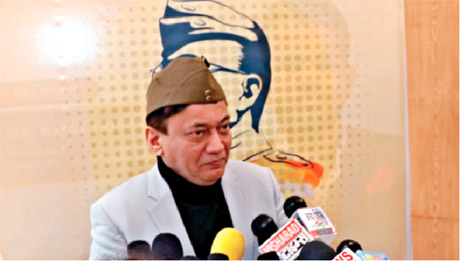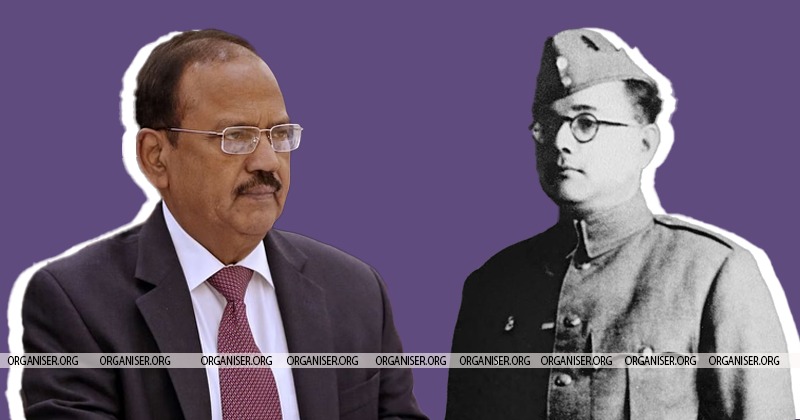The seminal role played by Subhas Chandra Bose in giving the British a bloody nose was downplayed by Marxist historians. Now, an authentic depiction of his contribution to the Independence of Bharat is being highlighted and celebrated by the Central Government led by Shri Narendra Modi.
Describing Netaji as a liberator of India, Dr Bhuvan Lall, author-cum-filmmaker, said, “What can we learn from Netaji? He wanted India to become Vishwa Guru. We are now in Amrit Kaal. We must follow the path laid by Netaji. He believed in hard work, ethics, patriotism, gender equality and economic equity. If we follow his path, we will be the greatest country.”
Dr Lall’s insightful comment on the great nationalist came while addressing students to mark the 126th birth anniversary of Subhas Chandra Bose at Asian Academy of Film and Television (AAFT) in Marwah Studios, Film City Noida on January 23.
Noting that Netaji’s ideology swept a new movement across the country, Dr Lall biographer of Subhas Chandra Bose, said his goal of Independence coupled with fearlessness and fortitude fueled patriotism in many people. “His entry into Indian politics gave a new dimension to the freedom struggle in the country,” said Dr Lal, to the audience, particularly students who were enlightened by his extempore narration of Bose’s struggle for Independence.
Pointing out that Netaji’s Azad Hind Fauj was given donations by Bharatiyas from across the country, Dr Lall revealed that AHF was given Rs 30 crores. “People donated their entire properties to Azad Hind Fauj. Even those hailing from economically marginalised families gave everything. Such was their commitment to the motherland. They knew that only Azad Hind Fauj could save them from the British.”
Every year, January 23rd is celebrated as Parakram Diwas to inspire people of the country, especially the youth, to act with fortitude in the face of adversity as Netaji did, and to infuse in them a spirit of patriotic fervour
Appeal to Azad Hind Fauj
Shahnawaz Khan, an ardent follower of Netaji and an important member of Azad Hind Fauj, once made a passionate appeal to his brave compatriots. “Khan said he needed 1,000 men, who were daring enough to come forward to fight the British for one last battle. Everyone wanted to go even though they knew that they would not come back alive. Men, who were not chosen, felt let down. This was the jazba of Azad Hind Fauj. AHF came as prisoners to India. The British called them traitors.”
Another interesting incident which Dr Lall recalled was that when Mahatma Gandhi came to visit the AHF camps, he was surprised to know how Hindus, Muslims and Sikhs were eating in a common kitchen. “The soldiers told him that there was Muslim tea and Hindu tea. Both were mixed and then distributed among the men,” Dr Lall said.
One Man Army
The British Government was pitted against Netaji. Their Army could no longer control (law and order). “The naval establishment went on strike. At Jabalpur, when soldiers sang ‘Kadam Kadam Badhaye Ja’, they were threatened by their British bosses with guns. Soldiers removed their shirts and proclaimed, ‘shoot us’. The British were planning to quit India. On August 15, 1947, we obtained our freedom. Many died, dreaming of this day. Sardar Patel ensured that the flag would be hoisted at Red Fort. Azad Hind Fauj participated in the Parade and sang the song,” said Dr Lall.
Liberator of Bharat
A patriot, who was working for Bharat’s Independence from the foreign soil, Netaji yearned to go to India in 1943. “His wish was fulfilled when the Japanese took him to Andaman Island and made him hoist the flag there.”
Interestingly, Dr Lall’s latest labour of love titled ‘Delhi In The Era of Revolutionaries (1857-1947)’, chronicling the role of unsung heroes, was recently released.
Every year, January 23rd is celebrated as Parakram Diwas to inspire people of the country, especially the youth, to act with fortitude in the face of adversity as Netaji did, and to infuse in them a spirit of patriotic fervour.

“Way back in 2016 we launched Netaji Subhash Chandra Bose Forum at Asian Academy of Film and Television (AAFT) to highlight the ideology of Netaji. Since then, we have been celebrating Parakram Day every year,” said Sandeep Marwah, President of International Chamber of Media & Entertainment Industries.
Describing Netaji as an Indian revolutionary who believed in violent resistance to British rule, Marwah said, one of Netaji’s most famous declarations was Tum mujhe khoon do mai tumhe azadi doonga (Give me blood, I shall give you freedom).”




















Comments